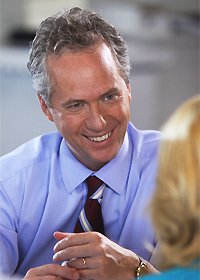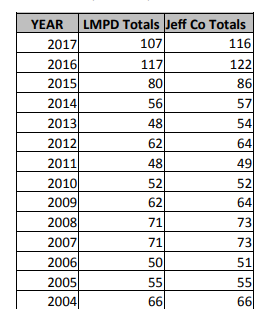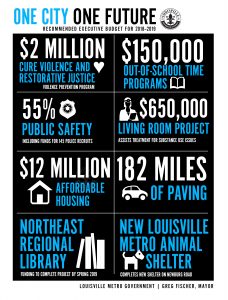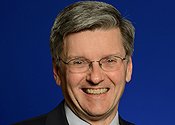 Mayor Greg Fischer announced today that the city plans to move a statue of Confederate officer and President of the Board of Park Commissioners John Breckinridge Castleman from the Cherokee Triangle neighborhood and the George Dennison Prentice statue from outside the Louisville Free Public Library.
Mayor Greg Fischer announced today that the city plans to move a statue of Confederate officer and President of the Board of Park Commissioners John Breckinridge Castleman from the Cherokee Triangle neighborhood and the George Dennison Prentice statue from outside the Louisville Free Public Library.
The Mayor’s decision comes after a review of recommendations by a Public Art and Monuments Advisory Committee that he appointed late last year to develop a guiding set of principles for evaluating existing and future public art and monuments in the city. Beginning in January, the committee held seven public meetings, gathering hundreds of comments from residents throughout the city before submitting their recommendations to the Mayor on June 30.
The Mayor’s announcement comes days before the one-year anniversary of the horrific display of hatred and bigotry that occurred in Charlottesville, Va., over plans to remove a Confederate statue there. Mayor Fischer said the anniversary is a reminder of the necessity for all citizens to look at our monuments and statues through the eyes of those who have historically been discriminated against.
“Our Public Art and Monuments committee worked very hard, in cooperation with citizens, to develop thoughtful principles to help ensure that our public art and monuments respect our history but reflect the values of today,” he said. “I support those principles, and I used the criteria laid out in their report to make this decision about the Castleman and Prentice statues.
“We all agree with the report’s finding that our city must not maintain statues that serve as validating symbols for racist or bigoted ideology – that’s why we relocated the Confederate statue near the University of Louisville two years ago,” the Mayor said.
“While Castleman was honored for contributions to the community, it cannot be ignored that he also fought to continue the horrific and brutal slavery of men, women and children; heralded that part of his life in his autobiography; and had his coffin draped with both a U.S. and Confederate flag,” he said. “And while Prentice was founder and long-time editor of the Louisville Journal newspaper, he used that platform to advocate an anti-Catholic, anti-immigrant message that led to the 1855 Bloody Monday riot where 22 people were killed.”
The Mayor said he understands that some view Castleman’s life as a story of redemption, given his civic contributions after the Civil War. And others have argued the statue should remain, perhaps with a marker noting Castleman’s complex history.
“But to make no decision and leave the statue in place, or attempt to ‘balance’ it somehow, is to rationalize the suffering still caused to people whose ancestors were bought, sold and bred like animals on a farm. That is the cold reality of the Confederate cause,” the Mayor said. “My threshold question was whether this statue would be appropriate in a predominately African American neighborhood. The answer obviously is no. It would be viewed as disrespectful of a historic and painful past.
“Moving these statues does not erase history. Moving these statues allows us to examine our history in a new context that more accurately reflects the reality of the day, a time when the moral deprivation of slavery is clear.”
Mayor Fischer said appropriate relocations will be explored; the city is, for example, in conversation with Cave Hill Cemetery about moving the statues to their family burial grounds there. There are legal and financial issues to address with any relocation, including, for Castleman, a review by the Cherokee Triangle Preservation District. If no other suitable sites are found, the statues will go into storage.
The goal is to have any issues resolved and the statues moved by the end of the year.
The Mayor thanked Public Art Administrator Sarah Lindgren, the Commission on Public Art, and the Public Art and Monuments committee members, as well as the hundreds of people who participated in public meetings throughout the city over the past year.
“This was a challenging, emotionally charged subject. But as I said when this process began, we can only be a city where all citizens can reach their full human potential if we face our big challenges head-on, and this includes the challenges of race and equity,” the Mayor said. “This process shows that Louisville has developed enough social muscle to have a deep, productive, and sometimes uncomfortable community conversation about these challenges.”
The Mayor echoed the committee’s conclusion in a letter sent to him with the report: “We urge our community to continue the work of open dialogue, not only about public art and monuments, but about all symbols of racism and discrimination and how we as a community can move forward to advance equity, inclusivity and healing.”
The committee’s report can be found at Louisville Metro Public Art’s webpage: https://louisvilleky.gov/government/public-art
Angela Leet Releases Statement on Crime Numbers
Mayoral candidate and current District 7 Councilwoman Angela Leet called the Fischer Administration’s claim that crime is down, “dishonest.”
“This claim is absolutely disingenuous. During Fischer’s first year in office, there were 49 homicides in the county. Last year, there were 108 homicides in the county. This year, we are currently on track to double the number of homicides in Fischer’s first year. So seeing a tiny downtick in a few week’s time is not a victory when all Fischer has managed to do is set a new normal of more than a 100 homicides a year,” said Leet.
 In a 2005 survey, Morgan Quitno Press ranked Louisville as the seventh safest large city in the United States with that rank dropping to number eight in the 2006 edition of the survey. Lousiville, however, failed to make independent security review site SafeWise’s 2017 list of 50 Safest Metro Cities in America at all and came in at 106 in WalletHub’s 2017’s Safest Cities in America rankings.
In a 2005 survey, Morgan Quitno Press ranked Louisville as the seventh safest large city in the United States with that rank dropping to number eight in the 2006 edition of the survey. Lousiville, however, failed to make independent security review site SafeWise’s 2017 list of 50 Safest Metro Cities in America at all and came in at 106 in WalletHub’s 2017’s Safest Cities in America rankings.
Leet claimed that the legacy of the Fischer Administration would be that “homicides have doubled, shootings have doubled, and drug overdose deaths have tripled” under the oversight of the current mayor.
The LMPD historical homicide data does show a dramatic uptick in murders over the past several years. The highest number of murders since 1960, the earliest year in which data is available, was 2016’s record setting year with 122 homicides in Jefferson County, followed closely by 2017’s number of 116 total homicides.
Fischer’s first year in office, 2011, saw the lowest number of homicides since 2003. The several years following his tenure as Mayor showed measurably higher numbers before beginning their remarkable increase to the numbers seen in recent years.
Leet continued, “For the 10 years prior to Fischer taking office, U of L Hospital admitted an average of 166 gunshot victims per year. During the Fischer Administration, U of L Hospital has seen an average of over 200 shooting victims, and that average is over 300 for the last 2 years. 1700 people have been admitted to University of Louisville Hospital for gunshot wounds since Fischer took office. That does not even include victims who were not admitted.”
Putting a rosy spin on crime numbers is nothing new, however. Last August we published the city’s release claiming that crime overall in Lousiville was down 4%, driven by large decreases in violent crimes such as rape and robbery, and smaller decreases in property crimes like larceny. The article, however, noted then that homicides were up by 20% over the previous year’s data.
However, Leet said of Fischer’s attempt “to spin a tale of ‘crime is down'” in a year in which he is up for reelection, “I am disappointed that Fischer is manipulating numbers and denying the reality of drug and gang issues in our neighborhoods.“
 By a vote 21 to 3, the Louisville Metro Council has approved the Fiscal Year 2018- 2019 Operating Budget for Metro Government. By a vote of 20 to 4, the Council gave its approval to the Capital Budget for the coming year.
By a vote 21 to 3, the Louisville Metro Council has approved the Fiscal Year 2018- 2019 Operating Budget for Metro Government. By a vote of 20 to 4, the Council gave its approval to the Capital Budget for the coming year.
“The approved budget continues to heavily fund public safety and infrastructure, including paving and sidewalks. It increases funding for the Office for Safe and Healthy Neighborhoods, which is helping to reduce crime in ways proven to work around the country. It maintains historically high funding for affordable housing. The Council has increased appropriations to the Library, to the Living Room project, which diverts people from the jail and emergency rooms, and to Dare to Care and New Roots, to address Louisville’s food insecurity issues. The budget also funds personnel and equipment to double the City’s graffiti abatement program,” says Councilman Bill Hollander (D-9) chair of the Budget Committee. “Budgets require compromise – and the results aren’t exactly what anyone wants. I thank the scores of people who appeared before Council to express their opinions on spending priorities, and Council members and staff who worked hard over the last two months to produce a budget that will continue to move Louisville forward.”
“This budget addresses many of the concerns that I and many of my colleagues had expressed regarding the Mayor’s proposed budget. Our amendments increased oversight and accountability in areas where additional scrutiny is needed and continues to push for a much needed new police headquarters and government building that will better help us serve the community” said Councilman Kevin Kramer (District 11), Vice Chair of the Budget Committee. “There were many areas of change that I would have liked to have seen incorporated into the final proposal, but I do believe that the budget that was passed tonight does continue to move our community forward.”
Aside from maintaining the operations and needs of Louisville Metro Government, the budget also highlights the following areas:
Preserves jobs at the Main Library and funds full staffing at the new Northeast Regional Library and the expansion of the St. Matthews Library. Requires Budget Committee approval of proposed renovations to the Main Library, including any changes to space utilization, staffing and services. ($265,000 increase in proposed budget to LFPL).
Focuses on food insecurity issues by doubling proposed funding to Dare to Care for general operations to a total of $200,000, and more than tripling proposed funding to New Roots to $70,000 (an increase of $100,000 for Dare to Care and $50,000 to New Roots).
Funds the Living Room program, diverting individuals from the jail and emergency rooms, at $1,000,000 and requires monthly reporting by Centerstone on usage and outcomes. ($350,000 increase in proposed budget).
Doubles Metro’s graffiti abatement program run by Codes and Regulation, providing for additional vehicles and personnel to operate them, beginning in February 2019.
Increases funding for the development of the new YMCA at 18th & Broadway by $50,000, bringing the total to $300,000.
Provides additional funding for Parks: $200,000 for Phase III of Charlie Vettiner Park; $75,000 to be matched by the Louisville Parks Foundation for soccer fields at William Harrison and Wyandotte Parks; and $50,000 for Quail Chase Golf Course.
Increases funding for Waterfront Development Corporation by $50,000, bringing Metro’s contribution to Waterfront Park to $1,037,000, to address an operating deficit and to provide for increased restroom cleaning in the park.
Allocates $1,000,000 for improvements at the Impound Lot (a reduction of $1,000,000 in the proposed amount due to timing issues on the need for the funds).
Maintains other recommended funding for paving, sidewalk repair and construction, LMPD, the Office for Safe and Healthy Neighborhoods, Heritage West, Parks, the Zoo and other projects and services.
Funds increased pension and healthcare costs, with no layoffs of Metro employees and no increase in taxes.
 Louisville Metro Council passed an Ordinance requiring nutritional standards and a healthy default beverage in children’s meals, the first in the nation to adopt the combined standards. The so-called “healthy-by-default” rule that passed 13-11 by the Louisville Metro Council aims to tackle the city’s skyrocketing childhood obesity rate and worsening type II diabetes epidemic. This Ordinance follows the National Restaurant Association’s “Kids Live Well” Program.
Louisville Metro Council passed an Ordinance requiring nutritional standards and a healthy default beverage in children’s meals, the first in the nation to adopt the combined standards. The so-called “healthy-by-default” rule that passed 13-11 by the Louisville Metro Council aims to tackle the city’s skyrocketing childhood obesity rate and worsening type II diabetes epidemic. This Ordinance follows the National Restaurant Association’s “Kids Live Well” Program.
Co-sponsor Councilwoman Vicki Welch (D-13) said, “Since restaurants are responsible for 25% of a child’s diet, this ordinance will be particularly effective in improving children’s health. Prevention of childhood obesity is also protecting our tax dollars from rising health costs of diabetes, tooth decay, high blood pressure, stroke and heart disease.”
In the upcoming months, restaurants that serve meals aimed at children will be required to provide milk, non-dairy milk, water, sparkling water or less than 25 calories/8 ounces drinks with no added artificial sweeteners as the default beverage option. Customers will still be able to purchase sodas, juices and other sugary drinks upon request.
“Parents will now be given the opportunity to start the meal off right with healthy beverage and food options,” Co-sponsor Rick Blackwell said. “We hope most parents will stick with the healthier option, protecting their children from the long-term chronic problems associated with sugary drinks, such as type 2 diabetes, obesity and tooth decay.”
Various studies have linked a daily sugary drink habit to a 26% higher risk of type 2 diabetes, a 27% increased risk of adult obesity and a 55% greater risk of childhood obesity, as well as higher incidences of heart disease, liver disease and metabolic disorder. Sugary drinks contribute directly to diabetes by spiking glucose, converting fructose into fat in the liver and spurring excess insulin production, wearing out the pancreas. Sugary drinks also contribute to weight gain by adding empty calories – void of fiber and nutrients – that do not contribute to fullness.
Councilman Blackwell and Councilwoman Welch met with many interested parties in drafting this ordinance and believe the final product protects parents’ abilities to make decisions for their children while also minimizes the onus on businesses to comply with the new law.
Today, 30% of Louisvillians, 24% of sixth graders, and 18 % of kindergartens are obese. The Centers for Disease Control and Prevention (CDC) estimates that one-in-three children born today will have diabetes by 2050.
“This policy is a common sense measure to support parents’ efforts to protect their children’s health. While communities all over the country wrestle with the disastrous consequences of growing childhood obesity and diabetes epidemics, Louisville drew a line in the sand.” said Welch. “The Council showed the powerful role that cities can play in solving big problems. Now, the healthy choice is the easy choice.”
 Mayor Greg Fischer proposed a 2018-2019 city budget that builds on the city’s momentum and commitment to public safety and growing jobs, despite the significant challenges of rising insurance costs and a $9.4 million bump in pension expense.
Mayor Greg Fischer proposed a 2018-2019 city budget that builds on the city’s momentum and commitment to public safety and growing jobs, despite the significant challenges of rising insurance costs and a $9.4 million bump in pension expense.
This $623 million general fund budget — with the theme “One City, One Future”— anticipates $26 million in new revenue, with 55 percent earmarked for public safety: LMPD, the Office for Safe and Healthy Neighborhoods, the Louisville Fire Department, Corrections, Emergency Services, the Criminal Justice Commission and Youth Detention Services.
“Public safety is our No. 1 priority, as evidenced by this budget and the ones before it,” the Mayor said about his eighth budget presentation, adding that the investments, and the strategy that accompanies them, is returning tangible results.
“In 2017, we saw our numbers on crime overall and violent crime in particular start to decline,” he said. “And while there’s lots of work ahead, I’m glad to say that this positive trend is continuing in 2018.”
The budget also includes investments in affordable housing, paving and workforce development, and funding to complete the Northeast Regional Library. When it opens in 2019, 90 percent of city residents will live within five miles of a full-service library.
In his remarks, the Mayor acknowledged budget challenges, including the serious impact of the state’s pension crisis and a $9.6 million employer health care cost increase. Though the budget avoids layoffs, he said, 49 positions will be eliminated through attrition. “We’ve worked to implement cuts and reductions in a way that‘s fair and minimizes the impact on city services,” the Mayor said.
The Mayor opened his presentation by highlighting Louisville’s economic momentum, evidenced by more than 72,000 new private sector jobs, 2,500 new businesses and nearly $13 billion in capital investment happening throughout the city since 2014, including a record investment of $800 million in west Louisville.
(Read the Recommended Executive Budget for 2018-19)
That progress, along with the revenue growth and smart financial planning, “allows us to continue to invest in ourselves and in key development opportunities,” he said, ranging from the Russell neighborhood transformation, including the planned Track on Ali, as well the Soccer Stadium District in Butchertown and redevelopment of Colonial Gardens in south Louisville.
(Read Mayor Fischer’s full remarks)
The budget maintains a high level of local dollars — $22.5 million — in paving roads, fixing sidewalks and creating bike lanes in the city, which reflects a commitment to the “fix it first” strategy of Move Louisville. And it provides funding to relocate LMPD headquarters, as well as the city’s vehicle impound lot.
In accordance with the city’s recently released plan to address the impact of substance use disorder, the budget increases funding to the Living Room Project, a partnership with Centerstone that helps people struggling with opioids or other substance use get treatment and mental health support instead of going to jail or the emergency room.
“We also have to continue supporting efforts to make sure citizens can meet basic needs, like housing,” the Mayor said, noting that in last three years, the city has invested nearly $30 million in the Affordable Housing Trust Fund and Louisville Cares, and is continuing that commitment this year by investing another $12 million in affordable housing.
Other budget highlights:
- Proposes $2 million for the Office for Safe & Healthy neighborhoods to fund restorative justice and violence prevention programs, including Cure Violence
- Continues commitment to the Russell neighborhood with $750,000 for private development efforts and job creation.
- Funds SummerWorks, which employed over 5,200 youth in 2017.
- Buys $7 million in first responder vehicles and equipment, such as police cars, ambulances, fire trucks, computers, defibrillators and other equipment.
- Provides $6 million to complete a new animal shelter on Newburg Road.
- Funds $2.2 million in parks upgrades, maintenance needs and repairs including a $500,000 match for the Olmsted Parks Conservancy.
- Continues funding of $1 million to gain control of vacant and abandoned properties.
- Invests $600,000 to plant trees to combat urban heat island, and improve health.
Mayor Fischer cautioned that while he remains optimistic about Louisville’s future, the state pension crisis “will be a drag on our budget for the foreseeable future” without accelerated revenue growth.
“Our economic momentum and our readiness for the future require more substantive and comprehensive revenue-producing tax reform,” he said, stressing that reform must include more local control, so that Louisville’s citizens and leaders can craft and implement strategies that work for the city.
“It would be easy in a challenging budget cycle like this to just focus on the needs of the moment. And certainly we have to address the concerns and opportunities facing our citizens today,” the Mayor said. “At the same time, we have to also keep an eye to the future. That’s been our approach from Day One, and it’s helped us work with our partners across the city to create a growing economy with tremendous potential for our city.”

Photo: Louisville Metro Council
Councilman Bill Hollander invites the community to attend a D9 Community Conversation on Louisville’s budget.
The meeting is Monday, April 30, beginning at 6:30 p.m., at the Girl Scouts of Kentuckiana, 2115 Lexington Road.
“Mayor Fischer will be presenting his proposed budget on April 26 and the Council’s Budget Committee, which I chair, will spend the next two months working on it,” says Hollander. “As that process begins, I’ll have some comments on the proposal at our D9 meeting but mainly I want to hear from Louisville residents about their views on how we should be spending their money.”
As with all D9 Community Conversations, discussion of any other subject is also welcome and Councilman Hollander will be available to talk with constituents about any questions, comments or concerns.
For more information about the meeting, contact Councilman Hollander’s office at 574-1109.

Photo: Louisville Metro Council
Councilwoman Cheri Bryant Hamilton is encouraging residents to come out to the District 5 Community Meeting on April 24th to talk with representatives of Louisville Metro Government if there are issues or concerns they would like to have addressed.
“I have invited various representatives and agencies to come and make themselves available to anyone who has a question about an issue or would like to know more about a program we offer in Metro Government,” says Hamilton
The District 5 Community Meeting is set for the Shawnee Golf Course Clubhouse, 460 Northwestern Parkway beginning at 6:00pm.
Among the departments invited; LMPD, MSD, Codes and Regulations, Metro Public Works and Assets, Metro Parks and Recreation, Vacant and Public Properties, Community Services, Safe and Healthy Neighborhoods, and a representative from the Jefferson County Clerk’s Office.
“I know for some, it is not easy to take off from work and come downtown to speak with someone in Metro Government. At this community meeting, we have brought Metro Government to one place. No appointments are necessary, just come in and talk,” says Hamilton. “Government works best when we know what is on your mind and how we can handle it together.”
For more information about the District 5 Community Meeting, contact Councilwoman Hamilton’s office at 574-1105.
 Weather
Weather Traffic
Traffic @LouisvilleDispatch
@LouisvilleDispatch @LouisvilleDisp
@LouisvilleDisp Subscribe
Subscribe
